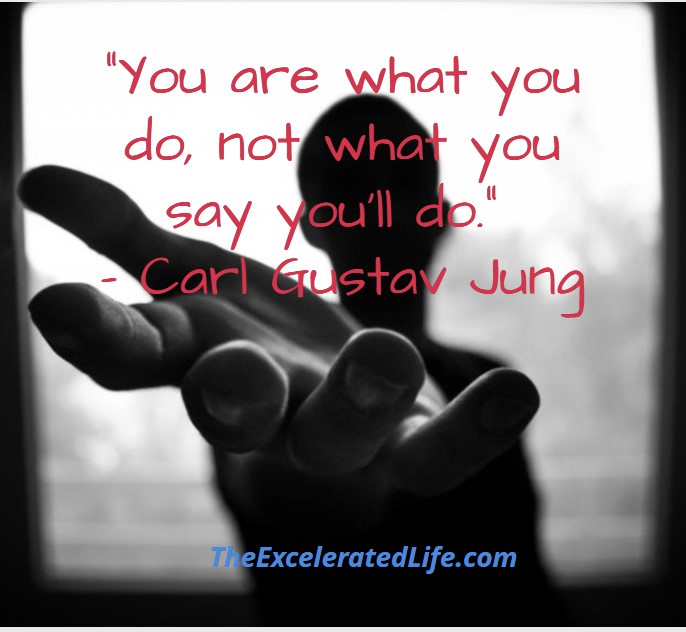Honoring your word, keeping your promises and commitments, is the road to becoming a trustworthy person. Doing what you say you will do builds trust in the eyes of other people, but just as importantly, in your trust in yourself.
TheExceleratedLife.com

Carl and Carol
This is the story of two people who worked in the same office, Carl and Carol. They were hired for similar positions at about the same time. But how they approach their work – and their lives – is quite different.
Carl often shows up late for work, but he thinks people will understand because “the traffic was terrible”. When his boss asked for some data he needed, Carl promised to have it to him “by the end of the day”. The boss has yet to receive that information. Carl mostly focuses on the easy tasks of his job, to “get them knocked out”, but it’s mainly because he doesn’t “feel like” doing the hard but important stuff. Recently, Carl signed up for an important training event, one that could have helped him get a raise. Carl meant to go to the training, but he “forgot”. A raise is not likely in his future. Carl talks a good game but he rarely does what he says he’ll do.
Carol, on the other hand, has made a habit of doing what she says she will do. She leaves for work an extra 15 minutes early and so she’s on time, even when traffic is snarled. When she was asked by the boss for some important information, she told him he’d have it by the end of the day. Her boss knew she was as good as her word, and sure enough, the data was on his desk within an hour. Carol always knows what her most important tasks for the day are, and she knocks them out before she gets to the easy, routine stuff. Whether or not she “feels like it” doesn’t come into the picture. Carol also signed up for the training event, added it to her calendar, and made sure to attend. She is now up for a raise and a promotion is in her future.
DWYSYWD = Do What You Say You Will Do
Want to know a quick way to build credibility and integrity? DWYSYWD.
Want to build a reputation as someone who is dependable and trustworthy? DWYSYWD
Want to feel good about yourself at the end of the day? DWYSYWD
DWYSYWD: Do what you say you will do. If you promised to call someone today . . . call them. If you told your spouse you would come home immediately after work . . . go home. If you said you’d take your children to the park . . . take them to the park. If you told yourself you’d skip the doughnuts in the break room . . . don’t have the doughnut.
In The Leadership Challenge, James M. Kouzes and Barry Z. Posner write: “DWYSYWD has two essential parts: ‘say and do’. These are the two dimensions of the behavioral definition of credibility.” [Kouzes & Posner] If you say you will do something, do it. If you have no intention of doing it, don’t say you will. This is the path to credibility and trustworthiness. It is acting with integrity.
Simple. Straightforward. Not necessarily easy to do.
What Happens When You Don’t DWYSYWD
What if you don’t do what you say you will do? It slowly destroys your credibility. When you make a promise, your spouse, your children, your employer, your colleagues, your friends add an * to the end of it. That * means to them, “Yeah, sure. We’ll see what happens.” They have no trust in your word.
When you don’t keep your word, it impacts your career. Remember Carl from the opening story? Not doing what you say you will do gives you a reputation as someone that can’t be depended upon. While they may not say it to your face (although they may well do eventually), your colleagues know that you can’t be counted on.
Trust is built by small actions, over time. Or trust is destroyed by small actions over time. This is true with others, but, importantly, with yourself as well. Which way are your actions taking you?
NOT Doing Becomes A Habit
So, are you mostly keeping your word and building trust? Or do you mostly “forget”, go back on your word, destroying trust? Like other behaviors, doing what you say you will do can become a habit. Unfortunately, not doing what you say you will do becomes a habit as well.
We say a lot over the course of a day. By some estimates, the average adult says about 12,000 words per day. [Shikati] And we sometimes say things that we won’t ever do. We make promises to others and to ourselves that we know we won’t keep. Doing this occasionally isn’t a big deal. The problem lies in the “slight edge” effect: Simple daily disciplines repeated consistently over time lead to success. Simple errors in judgment repeated consistently over time lead to failure. [Olson]
“We are all human,” writes blogger Skip Prichard. “We make mistakes. We forget. We fail. The point here is to not make this a habit. If you’re known as someone who doesn’t meet promises and expectations, you will face consequences. Strive to be someone of your word. Especially when it’s a ‘small thing,’ make sure you do it. After all, if you fail at the ‘little stuff,’ no one will trust you with the ‘big stuff’.” [Prichard]
When we disregard what we say, we are setting up a habit that leads us to unconsciously ignore the promises we make to others and to ourselves. Small errors in judgment repeated over time lead to a loss of trust and the eroding of our integrity.
What Happens When You DWYSYWD
When you do what you say you will do, you put yourself on the upward path to integrity and trustworthiness. You build your character and your reputation as a person who gets things done. [Shikati]
Importantly, you build trust in yourself. Instead of feelings -> actions -> identity, where you take your identity from your behavior (and your behavior depends on how you feel), you move to identity -> actions -> feelings. [Greitens] Decide on the person you want to become, act according to that identity, and let your feelings rise from those actions.
When you do what you say you will do, your teammates, colleagues, friends, and family can count on you. And you can count on yourself.
Challenges To DWYSYWD
If it’s such a good idea, then, why don’t we always do what we say we will do? There are several reasons.
It’s partly due to our old friends, the “two easies” -> easy to do and easy not to do. There is no immediate benefit from DWYSYWD and there are no immediate detriments from not DWYSYWD. It’s the slight edge effect we touched on earlier. Unless you use long-term vision to look months, even years, ahead, you won’t see the results that are inevitable – upward spiral or downward plunge.
Another challenge to doing what you say you will do is “common behavior”. [Booher] It isn’t unusual to hear people say such things as “Sorry I’m late. Traffic was terrible.” And we let each other off the hook. Again, an occasional failure is unavoidable – we are human, after all. But when we base our behavior on this and don’t hold ourselves to our word, not doing what we say we’ll do becomes our default.
A third reason we don’t do what we say we’ll do is misaligned incentives. [Christensen] We prioritize the things that give us short-term gain, not realizing that this eventually leads to long-term pain.
It all boils down to integrity, or in the words of Earl Nightingale, “never saying, ‘Well, everybody is doing it. I guess it won’t hurt if I do it, too.’ But it does hurt. If it’s wrong and we know it’s wrong, it does hurt.” [Nightingale]
Building Trust In Yourself
Honoring your word, keeping your promises and commitments, is the road to becoming a trustworthy person. Doing what you say you will do builds trust in the eyes of other people, but just as importantly, in your own trust of yourself.
Success in small things motivates you to try bigger things. Keeping your word on small commitments leads to keeping your word on bigger and bigger commitments. DWYSYWD becomes your default mode of operation. And that is embracing the Excelerated Life™!
Excelerated Self-discipline™ — doing what you say you will do — is one step in creating your Excelerated Life™, a life of flourishing and well-being, and a life of meaning, purpose, and service.
Read more about the Excelerated Life™.
Resources:
Booher, Dianna. “Why Doing What You Say Matters.” Forbes. Forbes Media LLC, May 19, 2018. Web. February 6, 2021.
https://www.forbes.com/sites/womensmedia/2018/05/19/why-doing-what-you-say-matters-integrity-means-influence/?sh=b9b3b955f30e
Christensen, Clayton M. How Will You Measure Your Life? New York: HarperCollins Publishers Inc., 2012.
Greitens, Eric. Resilience: Hard-Won Wisdom For Living A Better Life. New York: Houghton Mifflin Harcourt Publishing Company, 2015.
Kouzes, James M. and Barry Z. Posner. The Leadership Challenge: How To Make Extraordinary Things Happen In Organizations. San Francisco, CA: Jossey-Bass, A Wiley Imprint, 2012.
Nightingale, Earl. “Lead The Field.” PDFDrive. Asaha Inc., . Web. Date July 17, 2020. PDF file.
https://www.pdfdrive.com/lead-the-field-e186040772.html
Olson, Jeff. The Slight Edge. Austin, TX: Greenleaf Book Group Press, 2005-2013.
Prichard, Skip. “Do What You Say You’re Going To Do.” Skip Prichard. Skip Prichard, September 2, 2013. Web. February 6, 2021.
https://www.skipprichard.com/do-what-you-say-youre-going-to-do/
Shikati, Chomwa. “DO what you say you will DO.” What It Takes. Medium, May 17, 2018. Web. February 6, 2021.
https://medium.com/w-i-t/do-what-you-say-you-will-do-afb56b5711a8



One Reply to “Do What You Say You Will Do”